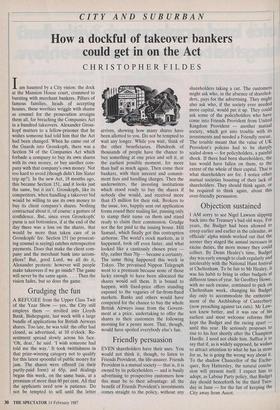Friendly persuasion
EVEN shareholders have their uses. You would not think it, though, to listen to Friends Provident, the life-assurer. Friends Provident is a mutual society — that is, it is owned by its policyholders — and is busily advertising to prospective customers how this must be to their advantage: all the benefit of Friends Provident's investments comes straight to the policy, without any shareholders taking a cut. The customers might ask who, in the absence of sharehol- ders, pays for the advertising. They might also ask who, if the society ever needed more capital, would put it up. They could ask some of the policyholders who have come into Friends Provident from United Kingdom Provident — another mutual society, which got into trouble with its investments and needed a Friendly rescue. The trouble meant that the value of UK Provident's policies had to be sharply scaled down — for policyholders, a painful shock. If there had been shareholders, the loss would have fallen on them, to the extent of the whole of their capital. That is what shareholders are for. I notice other mutual societies boasting of their lack of shareholders. They should think again, or be required to think again, about this over-friendly persuasion.


























































 Previous page
Previous page